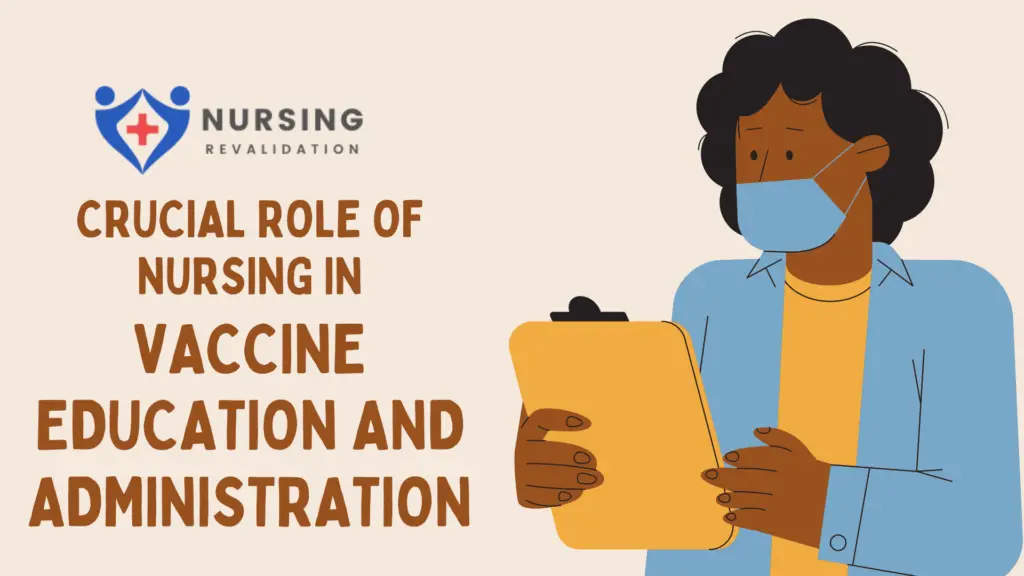In the realm of public health, the administration of vaccines stands as one of the most effective strategies for preventing the spread of infectious diseases. However, beyond the development and distribution of vaccines lies a critical component often overlooked: vaccine education and administration. Nurses, with their unique blend of expertise, compassion, and accessibility, play a pivotal role in ensuring the success of vaccination programs. This article delves into the importance of nursing in vaccine education and administration, shedding light on their indispensable contributions to public health.
The Foundation of Vaccine Education
Understanding Vaccine Science (H2)
Before delving into the specifics of vaccine education, it’s essential to grasp the fundamental principles of vaccine science. Vaccines work by stimulating the immune system to produce an immune response, thereby providing immunity against specific diseases. Nurses, with their comprehensive understanding of human anatomy, physiology, and immunology, are adept at conveying these complex concepts to patients in an accessible manner.
Dispelling Myths and Misinformation (H2)
In an era rife with misinformation, nurses serve as trusted sources of accurate information regarding vaccines. Through patient education sessions, one-on-one consultations, and community outreach programs, nurses debunk myths surrounding vaccine safety and efficacy. By addressing concerns and providing evidence-based information, they empower individuals to make informed decisions about their health and the health of their communities.
Table: Vaccine Education and Administration by Nursing Professionals
| Aspect | Description |
|---|---|
| Training | Nurses undergo specialized training in vaccine administration and patient education. |
| Communication Skills | Nurses excel in conveying complex medical information in an understandable manner. |
| Trust Building | Nurses cultivate trust and confidence among vaccine recipients through compassionate care. |
| Outreach Initiatives | Nurses participate in community outreach programs to expand vaccine access and equity. |
| Impact on Public Health | Nurses contribute to improved public health outcomes by increasing vaccination rates. |
The Role of Nurses in Vaccine Administration
Ensuring Safe and Effective Administration (H2)
Vaccine administration requires precision and adherence to established protocols to ensure safety and efficacy. Nurses undergo rigorous training to master the proper techniques for vaccine administration, including dosage calculation, site selection, and needle insertion. Their expertise minimizes the risk of adverse reactions and maximizes the vaccine’s effectiveness, thereby safeguarding public health.
Building Trust and Confidence (H2)
Trust serves as the cornerstone of successful vaccination campaigns. Nurses, with their compassionate demeanor and patient-centered approach, cultivate trust and confidence among vaccine recipients. By addressing concerns, providing reassurance, and fostering open communication, they foster a supportive environment conducive to vaccine acceptance.
The Impact of Nursing in Vaccine Education and Administration
Improving Vaccine Access and Equity (H2)
Nurses play a crucial role in expanding access to vaccines, particularly among underserved communities. Through mobile clinics, school-based vaccination programs, and outreach initiatives, they bridge gaps in healthcare access and ensure that vulnerable populations receive lifesaving vaccines. By addressing socioeconomic barriers and cultural considerations, nurses promote vaccine equity and mitigate disparities in healthcare delivery.
Enhancing Public Health Outcomes (H2)
The contributions of nurses in vaccine education and administration extend beyond individual patient encounters to impact broader public health outcomes. By increasing vaccination rates, nurses help prevent outbreaks of vaccine-preventable diseases, thereby reducing morbidity, mortality, and healthcare costs. Their efforts contribute to the attainment of community immunity, safeguarding the health and well-being of entire populations.
Conclusion
In conclusion, the importance of nursing in vaccine education and administration cannot be overstated. Nurses serve as educators, advocates, and frontline providers in the ongoing battle against infectious diseases. Their expertise, compassion, and commitment to public health make them invaluable assets in vaccination efforts worldwide. By recognizing and supporting the vital role of nursing in vaccine delivery, we can ensure the success of vaccination programs and safeguard the health of present and future generations.

